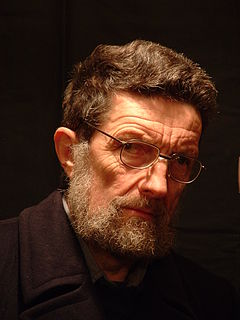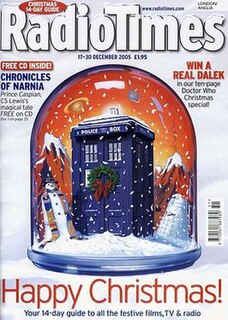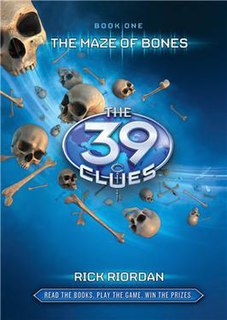
A crossword is a word puzzle that usually takes the form of a square or a rectangular grid of white- and black-shaded squares. The game's goal is to fill the white squares with letters, forming words or phrases, by solving clues, which lead to the answers. In languages that are written left-to-right, the answer words and phrases are placed in the grid from left to right ("across") and from top to bottom ("down"). The shaded squares are used to separate the words or phrases.
A cryptic crossword is a crossword puzzle in which each clue is a word puzzle. Cryptic crosswords are particularly popular in the United Kingdom, where they originated, Ireland, Israel, the Netherlands, and in several Commonwealth nations, including Australia, Canada, India, Kenya, Malta, New Zealand, and South Africa. Compilers of cryptic crosswords are commonly called "setters" in the UK and "constructors" in the US.

Christopher "Kit" Williams is an English artist, illustrator and author best known for his 1979 book Masquerade, a pictorial storybook which contains clues to the location of a golden jewelled hare created by Williams and then buried "somewhere in Britain".

An Easter egg is a message, image, or feature hidden in software, a video game, a film, or another, usually electronic, medium. The term used in this manner was coined around 1979 by Steve Wright, the then-Director of Software Development in the Atari Consumer Division, to describe a hidden message in the Atari video game Adventure, in reference to an Easter egg hunt. The earliest known video game Easter egg is in Moonlander (1973), in which the player tries to land a spaceship on the moon; if the player flies horizontally enough, they encounter a McDonald's restaurant and if they land next to it an astronaut will visit it instead of standing next to the ship. The earliest known Easter egg in software in general is one placed in the "make" command for PDP-6/PDP-10 computers sometime in October 1967–October 1968, wherein if the user attempts to create a file named "love" by typing "make love", the program responds "not war?" before proceeding.

Nonograms, also known as Hanjie, Paint by Numbers, Picross, Griddlers, Pic-a-Pix, and various other names, are picture logic puzzles in which cells in a grid must be colored or left blank according to numbers at the side of the grid to reveal a hidden picture. In this puzzle type, the numbers are a form of discrete tomography that measures how many unbroken lines of filled-in squares there are in any given row or column. For example, a clue of "4 8 3" would mean there are sets of four, eight, and three filled squares, in that order, with at least one blank square between successive sets.

Radio Times is a British weekly listings magazine devoted to television and radio programme schedules, with other features such as interviews, film reviews and lifestyle items. Founded in May 1923 by John Reith, then general manager of the British Broadcasting Company, it was the world's first broadcast listings magazine.

The Fool's Errand is a 1987 computer game by Cliff Johnson. It is a meta-puzzle game with storytelling, visual puzzles and a cryptic treasure map. It is the tale of a wandering Fool who seeks his fortune in the Land of Tarot and braves the enchantments of the High Priestess.

William F. Shortz is an American puzzle creator and editor and crossword puzzle editor for The New York Times.
David J. Bodycombe is an English puzzle author and games consultant. He is based in London, and his work is read by over 2 million people a day in the UK, and is syndicated to over 300 newspapers internationally. The British public know him best as the author of popular puzzle columns in publications such as the Daily Mail, Daily Express, Metro and BBC Focus magazine.
Round Britain Quiz is a panel game that has been broadcast on BBC Radio since 1947, making it the oldest quiz still broadcast on British radio. It was based on a format called Transatlantic Quiz, a contest between American and British teams on which Alistair Cooke was an early participant.

Swordquest is an unfinished series of video games produced by Atari, Inc. in the 1980s as part of a contest, consisting of three finished games, Earthworld, Fireworld, and Waterworld, and a planned fourth game, Airworld. Each of the games came with a comic book that explained the plot, as well as containing part of the solution to a major puzzle that had to be solved to win the contest, with a series of prizes on offer whose total value was $150,000. The series had its genesis as a possible sequel to Atari's groundbreaking 1979 title Adventure, but it developed mythology and system of play that was unique.
The Moral Maze is a live discussion programme on BBC Radio 4, broadcast since 1990. Since November 2011, it has also been available as a podcast.
Dizzy, or Dizzy – The Ultimate Cartoon Adventure, was the first video game featuring the character Dizzy, an anthropomorphic egg. The game was designed by two British brothers, the Oliver Twins. Dizzy was published by Codemasters and was released in June 1987.

A scavenger hunt is a game in which the organizers prepare a list defining specific items, which the participants seek to gather or complete all items on the list, usually without purchasing them. Usually participants work in small teams, although the rules may allow individuals to participate. The goal is to be the first to complete the list or to complete the most items on that list. In variations of the game, players take photographs of listed items or be challenged to complete the tasks on the list in the most creative manner. A treasure hunt is another name for the game, but it may involve following a series of clues to find objects or a single prize in a particular order.
GAMES World of Puzzles is a puzzle magazine formed from the merger of Games and World of Puzzles in October 2014.

The Immortal is an isometric action-adventure game originally created for the Apple IIGS. It was ported to the Amiga, Atari ST, DOS, Nintendo Entertainment System, and Sega Genesis. A wizard is attempting to find his mentor in a large and dangerous labyrinth. The game has a high degree of graphic violence. A Nintendo Switch re-release was published in 2020.

MAZE: Solve the World's Most Challenging Puzzle is a puzzle book written and illustrated by Christopher Manson. The book was originally published as part of a contest to win $10,000.

The Maze of Bones is the first novel of The 39 Clues series, written by Rick Riordan and published September 9, 2008 by Scholastic. It stars Amy and Dan Cahill, two orphans who discover, upon their grandmother Grace's death, that they are part of the powerful Cahill family, whose members constantly fight each other for Clues, which are ingredients to a mysterious serum. The novel has received generally positive reviews.

Ready Player One is a 2011 science fiction novel, and the debut novel of American author Ernest Cline. The story, set in a dystopia in 2045, follows protagonist Wade Watts on his search for an Easter egg in a worldwide virtual reality game, the discovery of which would lead him to inherit the game creator's fortune. Cline sold the rights to publish the novel in June 2010, in a bidding war to the Crown Publishing Group. The book was published on August 16, 2011. An audiobook was released the same day; it was narrated by Wil Wheaton, who was mentioned briefly in one of the chapters. In 2012, the book received an Alex Award from the Young Adult Library Services Association division of the American Library Association and won the 2011 Prometheus Award.












